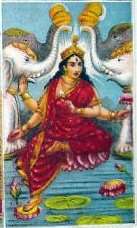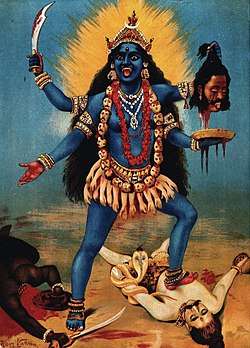Kamalatmika
| Kamala | |
|---|---|
| Goddess of fortune and wealth | |
 | |
| Affiliation | Parvati ,Mahavidyas , Adishakti , Mahakali and Mahalakshmi. |
| Abode | garuda or elephant |
| Mantra |
II sadācārapriye devī śuklapuşpa varapriye I I gomāyādi suci prīte mahālakşmī namostute II |
| Mount | Lotus , 4elephants |
| Consort | Shiva as Vishnu |
In Hinduism, Kamala (Sanskrit: कमला) or Kamalatmika (Sanskrit: कमलात्मिका) is the Devi in the fullness of her graceful aspect. She is believed as the tenth Mahavidya (great wisdom).[1] She is a form of Parvati as all the Mahavidyas are. She is daughter of Brighu sage.
Iconography
Kamalatmika has a golden complexion. She is being bathed by four large elephants, who pour kalashas (jars) of amrita (nectar) over her. She has four hands. In two hands, she holds two lotuses and her other two hands are in abhayamudra (gesture of giving assurance) and varamudra (gesture of conferring boons) respectively. She is shown as seated in padmasana (lotus posture) on a lotus,[1] symbol of purity.
Legend
Goddess Mahashakti had created the entire universe but her task yet still remained incomplete even though the universe was complete but it was unfinished due to the absence of prosperity. She had transformed herself into Goddess Kamala to manifest all types of wealth and prosperity in the world. Only by her appearing as Devi Kamala, the world will be prosperous. The appropriate time for it had come. She took birth as the daughter of sage Bhrigu and manifested prosperity in the world. Shiva and Vishnu are different but they are similar and also the same. That is why when the time was right, sage Bhrigu had Mahakaali in the form of Goddess Kamala married to Lord Vishnu, who embodied the form of Shiva. Although Goddess Lakshmi is married to Lord Vishnu, and as his wife as Goddess Kamala, she is Shakti (Durga), Parvati, Lakshmi and Sarawati as well as Tridev (Brahma, Vishnu and Mahadev). They are all in her, a part of her and she is in them. The trinity of the Gods, Lord Brahma, Vishnu and Mahadev as well as the trinity of the Goddesses, Saraswati, Lakshmi and Parvati originated from her. Because of the fact that Goddess Lakshmi resides on a lotus, she was then known as Kamala.
The name Kamala means "she of the lotus" and is a common epithet of Goddess Lakshmi. Lakshmi is linked with three important and interrelated themes: prosperity and wealth, fertility and crops, and good luck during the coming year.
See also
Notes
- 1 2 Kinsley, David R. (1997). Tantric Visions of the Divine Feminine: the Ten Mahāvidyās. Berkeley: University of California Press. p. 223. ISBN 0-520-20498-0.
Further reading
- Hindu Goddesses: Vision of the Divine Feminine in the Hindu Religious Traditions ( ISBN 81-208-0379-5) by David Kinsley

